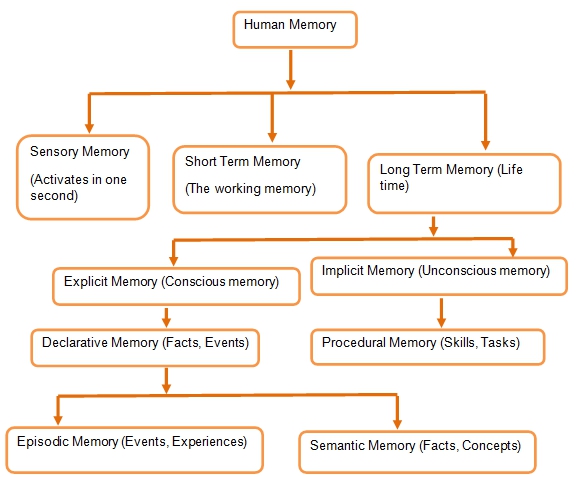Introduction
Memory processes involves different stages that interact in the thought mechanism. These processes culminate into a complete cycle consisting of storage, encoding and information recall. Thus, this reflective treatise presents a comprehensive chart summarizing the stages of memory. Moreover, for each stage, several examples are listed as they pertain to daily function of the memory.
Stages of Memory
The main stages of memory encompass encoding, storage and retrieval. This process is defined by sensory memory, short term memory, and long term memory. Reflectively, the sensory memory is activated in less than one second by a stimulus. For instance, smell may trigger an instant reflection. Short term memory is often referred to as the working memory in human beings. The most active memory is the long term memory that operates across one’s life time. It is divided into explicitly and implicit memory. The implicit category is defined by the unconscious memory of an individual. It is often associated with procedural memory that activates the skills and tasks. For instance, the brain uses the procedural memory to encode procedural skills and tasks that an individual is involved in.
The conscious or explicit memory is associated with the declarative responses such as memory of events and facts. The process of encoding, storage and retrieval is illustrated in the diagram below.
Human Memory

The declarative memory is further divided into episodic memory and semantic memory that controls responses to past experiences and events, and concepts and facts respectively. Memory process is complicated, dynamic, multi dimensional process, and is generally influenced by two factors, that is, internal influences and external influences. Internal influences are personal feelings and thought that includes self-concept, motivation, attitudes, emotions, and perceptions.
Besides, these factors are directly linked to internal and external interacting social aspects that control the pattern of thought and expressed feelings. For instance, an active mind is capable of remembering visual images; consequently having both text and images enables one to analyze the pictures. As a result, psychologists are progressively acknowledging that it is imperative to integrate images in the texts and comprehension as it helps the readers and viewers to make meaning faster.
The visual representational meaning of the memory stages conveys the relationship between the participants and the depicted structuring. The creation of a visual representational meaning proposes the space-based model for analysis centered in the placement of objects within the semiotic space of memory. The conceptual processes define, analyze and classify places, people or things including abstract ones in the encoding process. These processes can be classified into classificational, symbolic, and analytical. The classificational categorizes people, things or places in a tree structure in which things are represented as belonging to a particular class or order in the memory.
Conclusively, the meanings expressed by humans through visual forms have been conceived to have no literal equivalent in any other form of human memory communication. The stages of memory are very complex and often pass unrecognized. Generally, the stages involve encoding, storage, and retrieval of voluntary or involuntary information depending on the nature of the stimulus.